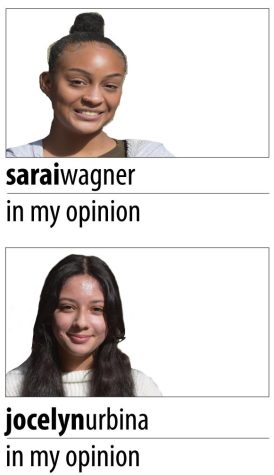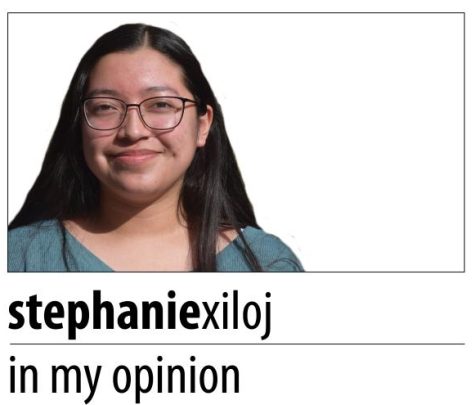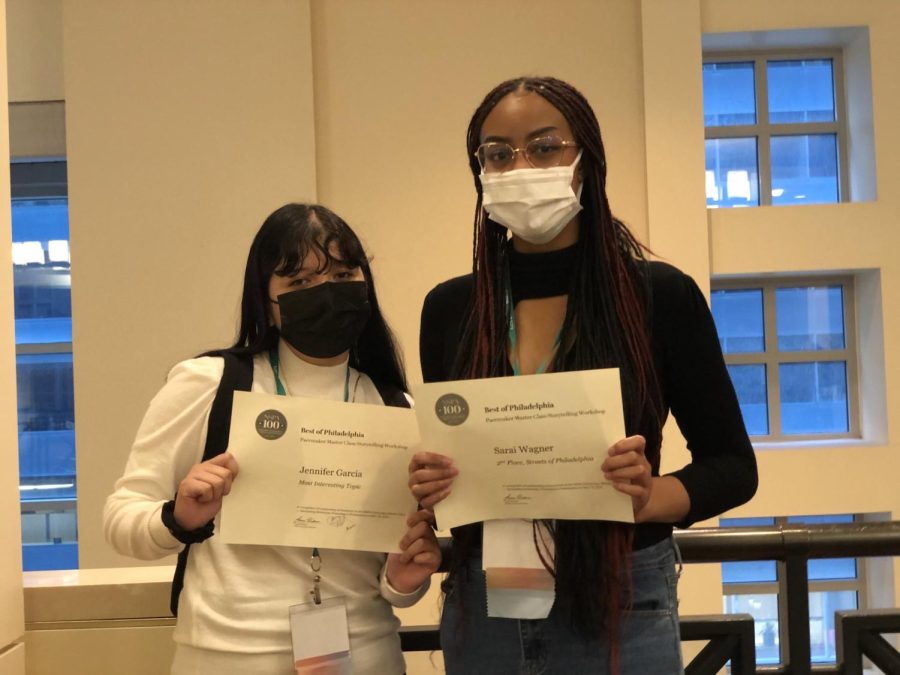Photo by Jocelyn Urbina
Sophomore Jennifer Garcia and senior Sarai Wagner received awards for their work at the convention
Philadelphia 2021: Speak Up and Represent Yourself and Your Community

The Journalism convention gave us a taste of experiences beyond being a high school journalist at Eastside – good and bad. Compared to the small school where we interview people we see everyday, we were pushed out of our comfort zones to report on people we didn’t know, in the middle of Philadelphia’s largest market, amid the hustle and bustle of it all. We three were assigned to three separate small teams with students from across the country, to work together to produce articles and videos.
Through the process, we learned about people living in another part of the country (see UNTOLD STORIES), and learned about ourselves, too. We experienced some of the challenges we might face at college. We learned the importance of speaking up, especially when it comes to representation of diverse voices, stories, and contributions in a project like the ones we produced.
 We can admit that it’s intimidating to share our opinions. It puts us in a vulnerable position, and we are aware that there will be people who disagree with what we have to say. However, that doesn’t make our words any less valuable. For many, not even the encouraging classroom environments we have at Eastside make it easy to share publicly, so the thought of sharing in a huge future lecture hall or seminar is completely unimaginable.
We can admit that it’s intimidating to share our opinions. It puts us in a vulnerable position, and we are aware that there will be people who disagree with what we have to say. However, that doesn’t make our words any less valuable. For many, not even the encouraging classroom environments we have at Eastside make it easy to share publicly, so the thought of sharing in a huge future lecture hall or seminar is completely unimaginable.
When students enter college, Imposter Syndrome (the feeling of not actually being qualified to belong to the group or job you have been admitted to) often sets in, and many of us will find it 20 times harder to share thoughts and opinions in classes in college. Most of us will be heading off to colleges where students who look like us will be the minority and harder to find. At the convention, we realized that sometimes it may feel like other students in our classrooms won’t pay attention to us nor give us the respect that all students are entitled to from their peers.
When we faced that fact, we felt discouraged. Sure, working alongside complete strangers with different backgrounds and journalism experience forced us to unite, and our teams managed to agree on a single angle to explore in our reporting. But when it came to choosing which reporting would appear in the final version of the project, we found our work discounted, overlooked and excluded.
For example, the Reading Terminal Market contains many diverse businesses, with all sorts of people, so it shouldn’t have been hard to include people with different backgrounds and experiences. And it wasn’t. We found stories from Black business owners and one selling unique items from Morocco. But none of these stories made it into the final projects submitted by our teams.
When we came back together with our Eastside classmates that evening and reflected together on our separate experiences, we realized that our reporting had been fun and successful– the hard part was advocating for these business owners who were left out of the writing process. In each of our three separate teams, a student from another school stepped forward, full of confidence as a writer and editor, and took charge. As a result, their reporting dominated the article while ours was left out.
We had to work to find the courage to speak up and ask why the team wasn’t including the unique businesses we had reported on. At first, we watched as the self-appointed lead writer pieced together information and quotes provided by all the reporters on the team. It became tiresome to stay silent about the fact that some diverse voices were being omitted, but it was hard to speak up. We tried writing our contributions on the end of the shared document, hoping they would be noticed. But by that point, the contributions were no longer central to the theme, so they were considered irrelevant and not included in the final version.
In one case, the final article that was submitted told the stories of white children affected by the pandemic, a mother who had a baby during the pandemic, and a few businesses – none of them owned by people of color. We felt embarrassed for having taken up people’s time and gotten involved in their stories, and then having our silence mean they weren’t included in the article.
That kind of discouragement made us feel like we shouldn’t bother saying anything next time. But after we came together and expressed our frustrations, we understood the damage caused by our not speaking up. By remaining silent, the conversation doesn’t benefit from the diversity that we bring, individually and quite possibly as the only person-of-color in the room. While many colleges continue to make diversifying their campuses a goal, it means little if those POC voices are not reflected in academic conversations. Unfortunately, Black and brown contributions have often been erased in intellectual spaces. Our goal should be to change that. By raising our hands to ask a question, or putting in our two cents in a Socratic seminar, we are asserting our presence, and adding our unique perspective to the conversation.
So, how do we become part of the conversation? There are many ways to get our voices out there and many platforms to do it on. By raising our hands to ask a question, or putting our two cents in a Socratic seminar, we are asserting our presence and adding our unique perspective to the conversation. And that only happens by each of us overcoming our shyness or discouragement and speaking up. We can write a blog or join a movement to convey our opinions and beliefs. If we join an unrestricted club or team where people come together around shared interests – like journalism or sports or cooking or music – we make the point that people of all kinds can contribute to interests of all kinds. Not all participation requires being vocal – we just don’t want fear to hold us back from adding value to a conversation.
When the fear sets in, we are determined to remember that our voices could add value to a conversation. By speaking up, we challenge not only ourselves but others around us to think, to question their stances on a subject or to recognize their existing biases. In Philadelphia, we felt firsthand that as students of color, we must contradict stereotypes and not let our unique experiences go unheard or invalidated.
